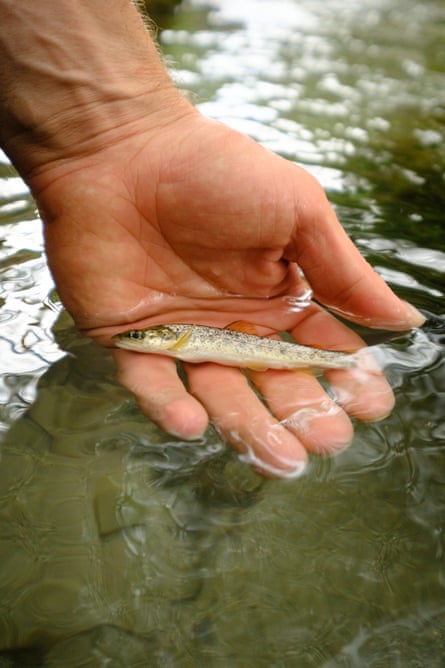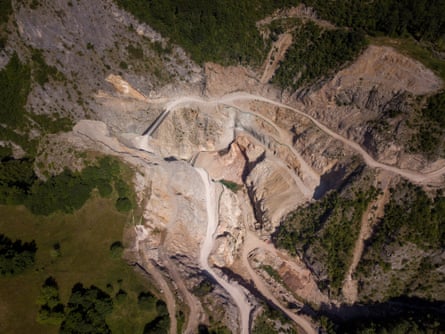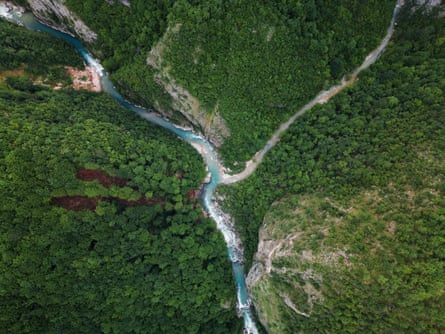But lethal landmines left behind from the country’s two-decades-old conflict litter its forested slopes, and wild dogs roam the trails. Poring over a map from the country’s mine action centre, ecologist Gabriel Singer, a professor at the Institute of Ecology at the University of Innsbruck, assesses the safest route. Red and black lines indicating where mines lie mark both sides of the Neretva where it meets the Ljuta, leaving just one perilously steep slope navigable.
Clambering over landmine-ridden hillsides is not a typical undertaking for most ecologists, but Singer and fellow scientist Kurt Pinter, who completed the trek in June, are driven by a mission: to save the Neretva. The river, which runs 140 miles (225km) from the Dinaric Alps to the Adriatic Sea, supports bears, wolves lynx and myriad rare species. It ranks among the most biodiverse and intact rivers in Europe – but ecologists say it is also among the most threatened.
More than 50 dams, including one already under construction, are planned along its length and tributaries. If allowed, the scientists say, the dams risk destroying the waterway, its inhabitants and the wider ecosystem. Dams radically change the hydro-morphology – the physical features – of a waterway, replacing turbulent river sections with still water bodies. Their fragmentation of the river can prevent fish migration, and cause dramatic drops in the movement of sediment vital for fish spawning. These impacts usually damage river ecosystems, causing losses of key aquatic species and ecological functions.
Singer and Pinter were among 70 scientists from 17 countries who descended on Ulog for Neretva Science Week in the summer. Experts on bats, mammals, insects and fungi waded through rivers and braved underwater caves to record rare species here, gathering samples of eDNA – the genetic material shed by organisms into the environment – to examine its biodiversity.
The pair, who took samples in the Ljuta, hoped to uncover evidence for what they had been told by local fishers: that the tributary was a spawning ground for the elusive soft-mouth trout (Salmo obtusirostris), an endangered species prized by Bosnian fly fishers.
Pinter, a freshwater ecologist at the University of Natural Resources and Life Sciences, Vienna, describes the fish as the “holy grail” of the Neretva. The river system is one of its last strongholds, he says. “There are only a few Balkan rivers where you can find this endemic species. It is almost extinct.”
If you build dams, you lose the aquatic species, but also the landscape the river feeds and the forest biodiversity
Gabriel Singer
A few kilometres upstream of the Ljuta is the Ulog construction site, which will be a 35-megawatt hydropower plant, with a 53-metre-high dam. Access roads cut through the mountains and the valley below is already stripped of trees, to make way for the 5km reservoir.
“Because the Ulog hydropower plant is so close to here, it would definitely affect the nursery areas,” Pinter says. The soft-mouth trout spawn in the gravel and their larvae burrow into it, he says. But because a dam’s weir holds back sediment, there is likely to be a lack of gravel downstream – meaning fewer spawning grounds.
“If there is a gravel deficit, it will impact the trout’s ability to reproduce,” Pinter says.

From the Upper Neretva, the Guardian collected a series of river samples of eDNA, the genetic material shed by organisms into the environment, to examine its biodiversity.
After analysis of the eDNA samples was complete, the Guardian received an email from Pinter: “Karen! Habemus soft-mouth trout. All three samples positive.” He hopes the results will help stop the eight hydropower plants planned on the Ljuta and may even put a stop to the Ulog plant.
“I want to show the Bosnian people the species has important nursery areas up there, that it is their treasure. Hydropower is the oldest source of renewable energy, but it has one of the heaviest impacts on ecosystems. They should know what they are about to lose.”
Singer says the biodiversity and climate crisis means scientists have a responsibility beyond publishing scientific papers. “We have an extinction debt,” he says. “We have lost 80% of our freshwater ecology over the last four or five decades. If you build dams, you lose the aquatic species, but also the landscape the river feeds, the terrestrial ecosystem and the forest biodiversity.
“We need to switch modes and talk to the public and political decision-makers,” he says.
Benjamin Barca, head of conservation at NatureMetrics, who analysed the eDNA samples from the Upper Neretva for the Guardian, found traces of beech martin, chamois, vole, dormouse, roe deer and frogs. While the sample size was low, the results indicated a pristine river, says Barca. “If you compare, for instance, to sites in the UK, it is more unique and diverse.”
Europe has the most obstructed river landscape in the world; the number of barriers such as dams, weirs and fords is estimated at more than 1m, according to a 2020 EU study. Cumulatively, these barriers are among the main causes of the 80% decline in freshwater biodiversity and 55% loss of migratory fish populations in Europe’s rivers.
Hydropower made up 37% of Bosnia’s electricity production in 2021. In the Balkans, where rivers are among the most pristine or “near natural” in Europe, they are threatened by 3,300 planned hydropower plants. Developers of the dams say they bring employment and valuable income, in rural regions where there is little of either. Ulog, a once thriving town of 400 people, now has only 12 inhabitants.

A spokesperson for EFT, the energy trading and investment company building the Ulog dam, said in a statement that the environmental impact assessment (EIA) and permit “defined appropriate mitigation measures to eliminate or minimise the environmental impact of the project”, but declined to provide details of how such measures would work. “The EIA and the ongoing regular environmental monitoring in the past years did not identify the soft-mouth trout in the HPP Ulog project area,” he said.
In a 2022 report of the committee of the Bern Convention, an international agreement to protect flora and fauna, the EIA for the Ulog dam was identified as having “outdated” and insufficient baseline data and “insufficient and not feasible” proposed mitigation measures.
The Ulog project would bring employment and income to one of the most undeveloped municipalities in Bosnia and Herzegovina, and an investment of €90m (£78m), the spokesperson said. The scheme will result in reductions of 87,846 tonnes of CO2 equivalent emissions a year compared with fossil fuels, he said, helping with the mitigation of the climate crises.
Radomir Sladoje, mayor of Kalinovik, the local municipality, acknowledged to scientists gathered in Ulog in June that the authority had approved of the dam, but said the area needed the compensation provided by the dam company.
“Maybe it was wrong,” he told the Guardian in June, adding that after giving the approval, he was won over by the argument that tourism, including rafting and mountain biking in the Upper Neretva, could bring in revenue if the river was protected. “Now if someone touches the upper part of the Neretva, I will protest myself.”

At a spot in the mountains overlooking the Ulog dam’s construction site, the valley stripped of trees, Ulrich Eichelmann, the CEO of Riverwatch, says: “It might be too late.”
But preserving the pristine upper reaches and its tributaries is still a fight worth having, he says. Last year, the conservationists won the support of the Bern Convention committee. Members of the committee recommended the government of Bosnia and Herzegovina halt the construction of Ulog and cancel hydropower plants on the river’s upper part.
In July, contracts for 15 small hydropower plants along the Neretvica, a tributary of the Neretva, were cancelled, in a victory for the resident-led protests against them.
The data gathered at Science Week will be vital for the legal battles planned against the Ljuta and other hydropower projects, says Eichelmann. “This gives us ammunition against all the dams, including Ulog. We simply cannot allow the destruction of one of the most diverse and beautiful rivers of Europe.”
Source : The Guardian















